Angel's Background
Born in 1896, Angel Lorelei grew up in a household marked by both the unity and division of two cultures. Her mother, Liese Weiss, hailed from a distinguished German family in Hamburg, a city known for its rich artistic traditions and intellectualism. Once an aspiring opera singer, Liese had left behind her life on the stage after marrying Charles "Charlie" Lorelei, a British officer stationed in Germany after the Franco-Prussian war. Charlie, a man devoted to duty, embodied the Victorian values of discipline and restraint, yet his deep love for music was apparent, even if often hidden.
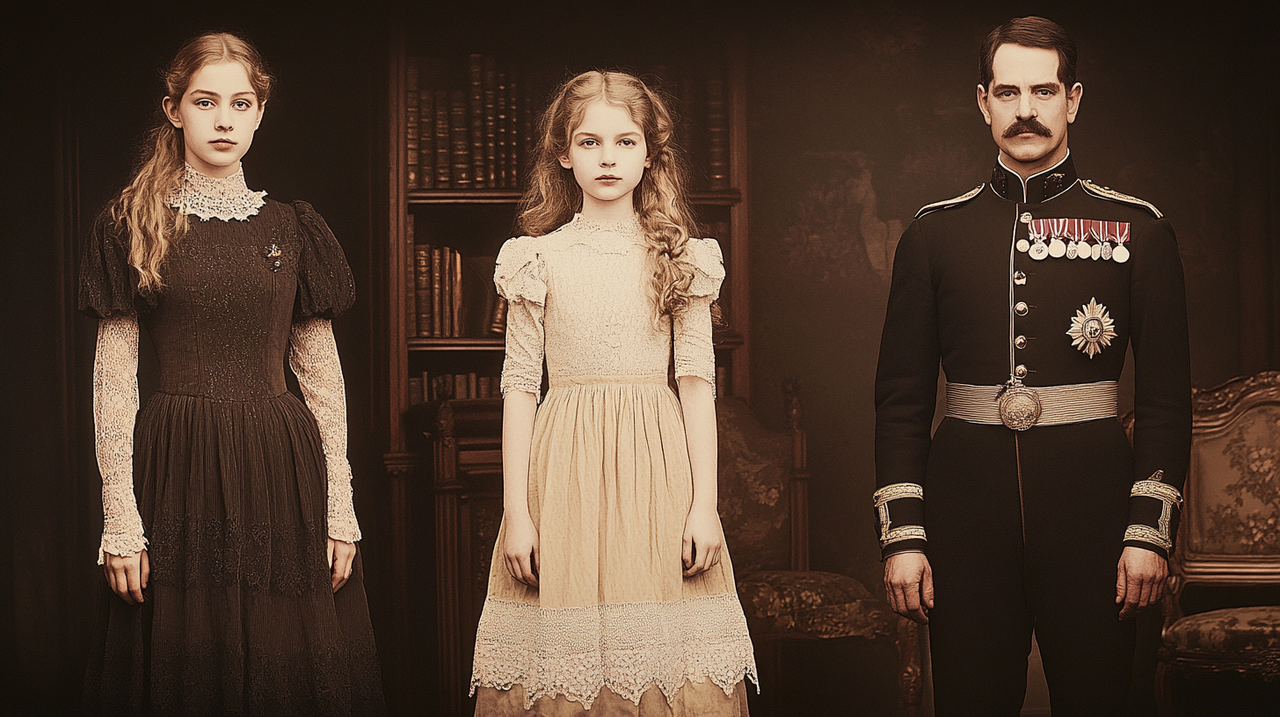
Angel’s home life was a blend of Germanic passion and English propriety. As a child, she would listen intently to her mother’s ballads—songs of love, loss, and valor that had been passed down through generations. Meanwhile, her father would read her stories of British naval victories, instilling in her a sense of loyalty and pride in the Crown. The duality of her upbringing, split between the reserved English side and the expressive German side, created a tension in Angel’s identity that would follow her into adulthood.
From an early age, Angel felt compelled to balance these identities. Friends described her as thoughtful but intense, the kind of person who could spend hours contemplating a single poem or melody. She was naturally drawn to music, and in her mother’s absence, she would hum folk songs that spoke of unbreakable spirits and quiet rebellion. In private, Angel often wondered if these melodies reflected something deeper about her—a yearning for a life that transcended the boundaries of her gender and nationality.
Living Through Cultural Tensions
By the time Angel turned 17, the whispers of war had become a roaring reality. Germany and Britain, two countries she loved in different ways, were on the brink of conflict. As the daughter of an English officer in a German city, Angel felt like an outsider in both cultures. The tension within her family mirrored the larger political landscape; her mother, deeply loyal to Germany, believed that Britain’s interference was unjust, while her father maintained a rigid loyalty to the Crown and its allies.
This division strained her family, and Angel felt the weight of it profoundly. Initially, she used her knowledge of both cultures as a spy, gathering information to support the British cause. Her decision to help Britain was born out of a sense of loyalty to her father and a belief that her actions could ultimately bring an end to the conflict. However, over time, she became disillusioned with the solitary nature of espionage and felt a strong desire to fight alongside others rather than remain in the shadows.
Angel’s Resolve to Join the War
By the spring of 1917, Angel made her decision. Inspired by the stories of women who had disguised themselves in wars past, she cut her hair, altered her voice, and assumed the alias "Tommy." She forged documents, claiming to be the son of a family friend who had perished in combat, and took on the identity with a resolve that surprised even herself. Her application was accepted, and within months, she found herself in a world that was both exhilarating and terrifying—the frontlines of the Western Front.

Life as "Tommy" on the Frontline
As Tommy, Angel adapted quickly to the realities of trench warfare. The camaraderie she experienced with her fellow soldiers was unlike anything she had known. She learned to laugh, drink, and fight as they did, finding a strange solace in her new life of mud, blood, and survival. However, the horrors of war weighed heavily on her. The shelling, the cries of wounded comrades, and the ever-present threat of death became her new reality.
Angel found herself humming her mother’s old songs during moments of quiet, a comfort to her comrades as well as to herself. Her fellow soldiers came to rely on her presence as a source of stability, often gathering around her during lulls in the fighting to listen to her quiet melodies. Unbeknownst to them, these songs carried fragments of her hidden self, a reminder of her identity as Angel even as she fought as Tommy.
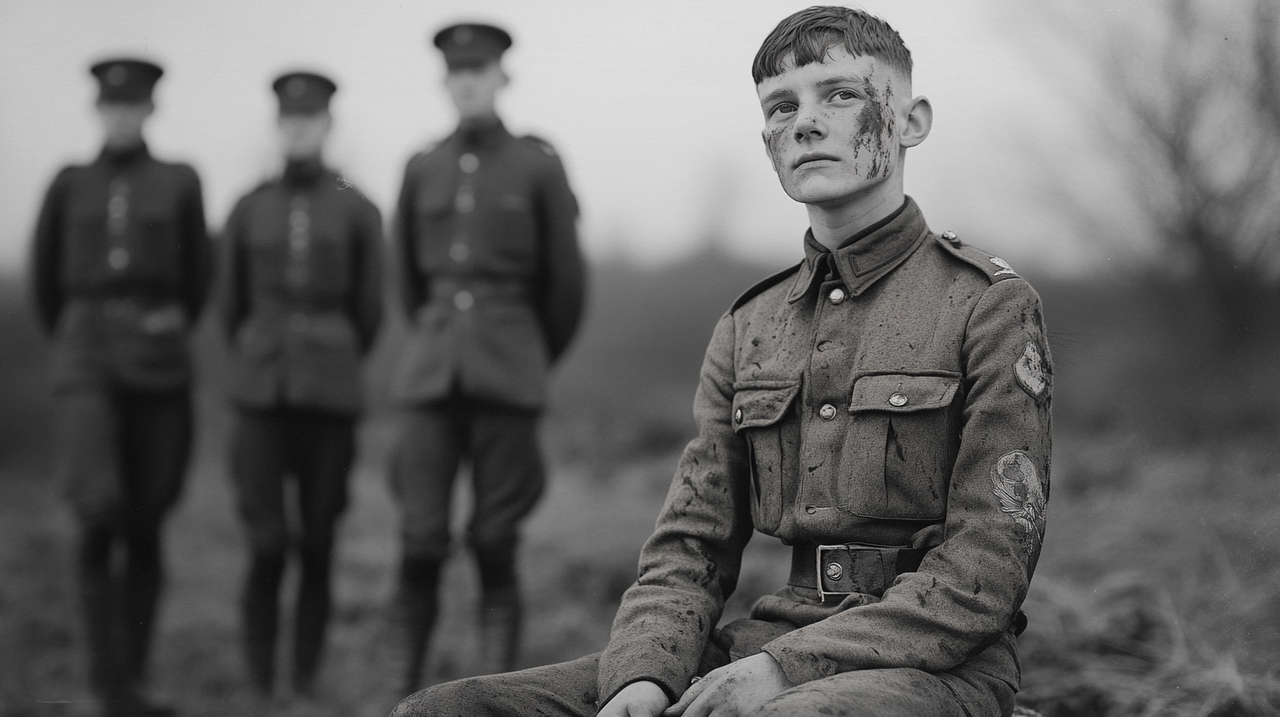
Angel’s Final Song
In late 1917, during one of the bloodiest stretches of the war, Angel met her end in a fierce firefight. Reports from her fellow soldiers recount that in her final moments, she sang a haunting melody, one that pierced the air even amidst the sounds of gunfire and chaos. Those who survived claimed they could hear her voice lingering in the silence after the battle, a sound that would follow them for the rest of their lives.
This song, which some described as an otherworldly lament, quickly became a legend among her squad. Her comrades believed it was her way of defying death, a final act of rebellion against the violence that had claimed so many lives. The melody was passed down from soldier to soldier, eventually reaching civilians and even musicians who heard the tale and were moved to incorporate it into their works.
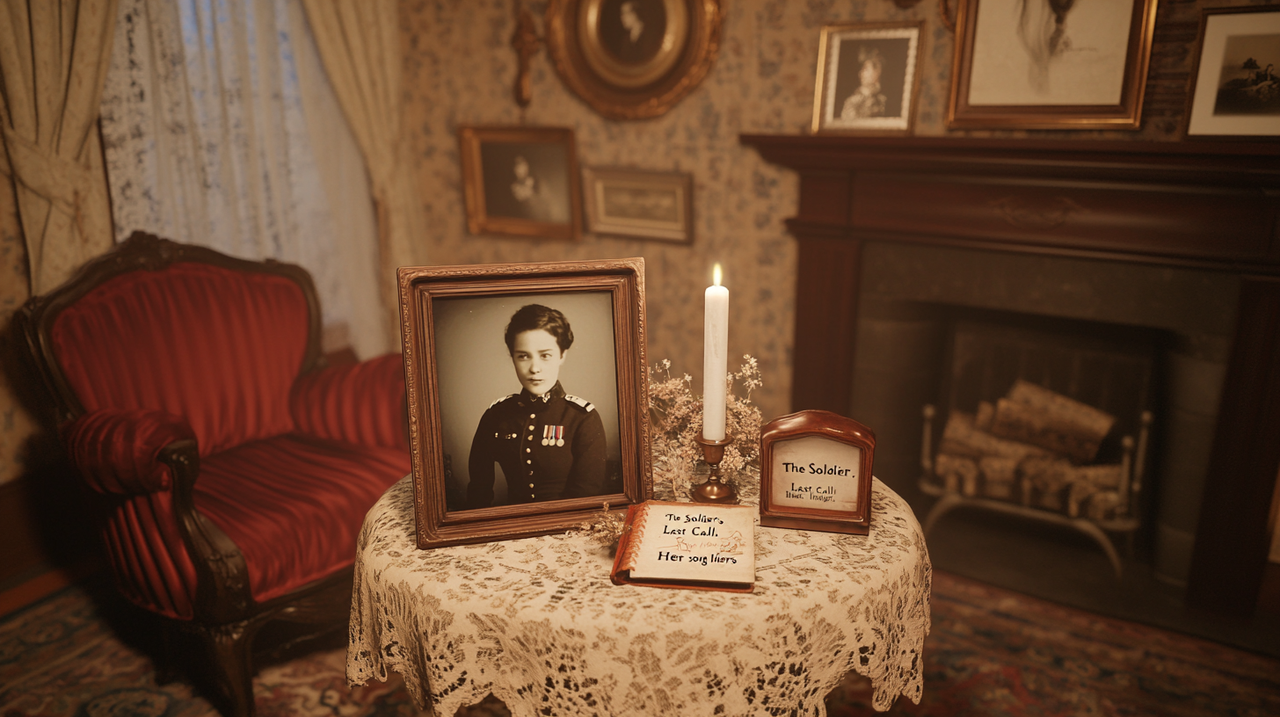
The Dual Legacy of Angel Lorelei
Angel's story is remembered not just as a tale of heroism, but as a symbol of the inner conflicts that defined her life. For those who knew her, she embodied the spirit of both Britain and Germany—a paradox made flesh, caught between duty and personal conviction, between life and the inevitability of loss. Her final song is said to capture the essence of this duality, a melody that holds both the sorrow of loss and the strength of resolve.
The Disguised Squad: The Ghosts of the Trenches
Angel wasn’t alone in her mission. She was part of a secretive group known only as the Ghost Squad—a clandestine unit comprised entirely of women who, like Angel, had enlisted under male aliases. These women came from diverse backgrounds and regions, drawn together by a shared desire to make their mark in a world that had forbidden them to fight. They each held different reasons for enlisting, from revenge to patriotism to an unyielding sense of duty. Together, they formed a bond stronger than blood, grounded in a shared defiance and survival.

Who Were the Women of the Ghost Squad?
Each member of the Ghost Squad brought her own story, her own scars, and her own motivations to the trenches. There was Clara, a former nurse who had seen her entire family lost to the German forces, whose eyes burned with a quiet fury whenever she spoke of home. Amelia, a factory worker turned soldier, had dreamed of being more than the life afforded to her by society. And then there was Maeve, an Irish immigrant with an uncanny ability to navigate through the densest fog and shellfire, earning her the nickname “Mist.”
For all of them, joining the war was more than a patriotic duty; it was an act of rebellion, a way to seize control of their own destinies. United in secrecy, they were bound by a pact to protect each other’s identities, to live as men and die as heroes if necessary. They swore that if any of them fell, their memories would live on through stories, songs, and whispered legends.
The Code of Silence and Sacrifice
To survive, the Ghost Squad operated with extreme caution. Their code demanded absolute silence about their true identities, even among themselves. The Ghost Squad members were usually scattered throughout different units, but would occasionally form up for special missions that required their unique skills. Angel’s experience as a spy often brought her into these missions, acting as a liaison or coordinating intelligence that was crucial for success. Their discipline and stealth earned them the nickname "Ghosts" from those who noticed their quiet movements and sudden appearances.
At the heart of the squad’s code was a pledge they called "The Silent Pact." Every member vowed that if one of them fell, the others would carry her memory forward through song and story, a ritualized tribute that would make her life, and her defiance, echo beyond the battlefield.
"We march unseen, we fight unheard. When one of us is taken, her song will rise in silence and endure in the hearts of those left behind."
Living as Ghosts on the Battlefield
Living in disguise was both a survival tactic and a source of constant tension. For the women of the Ghost Squad, every day was a balancing act. They had to maintain the appearance and demeanor of men while hiding their true selves, both from their enemies and from their allies. This dual life created an unspoken bond, one that went beyond ordinary camaraderie. They were not merely fellow soldiers; they were co-conspirators in a shared rebellion.
The Ghost Squad developed their own silent language of hand signals and glances, allowing them to communicate under even the most dangerous conditions. In the chaos of battle, they instinctively knew where each member was, protecting one another as if their lives depended on it—because, in truth, they did. When night fell and quiet settled over the trenches, the squad would gather in hidden corners to share food, laughter, and, occasionally, quiet songs of home. These moments of unity fortified them, a brief respite from the dangers that surrounded them daily.
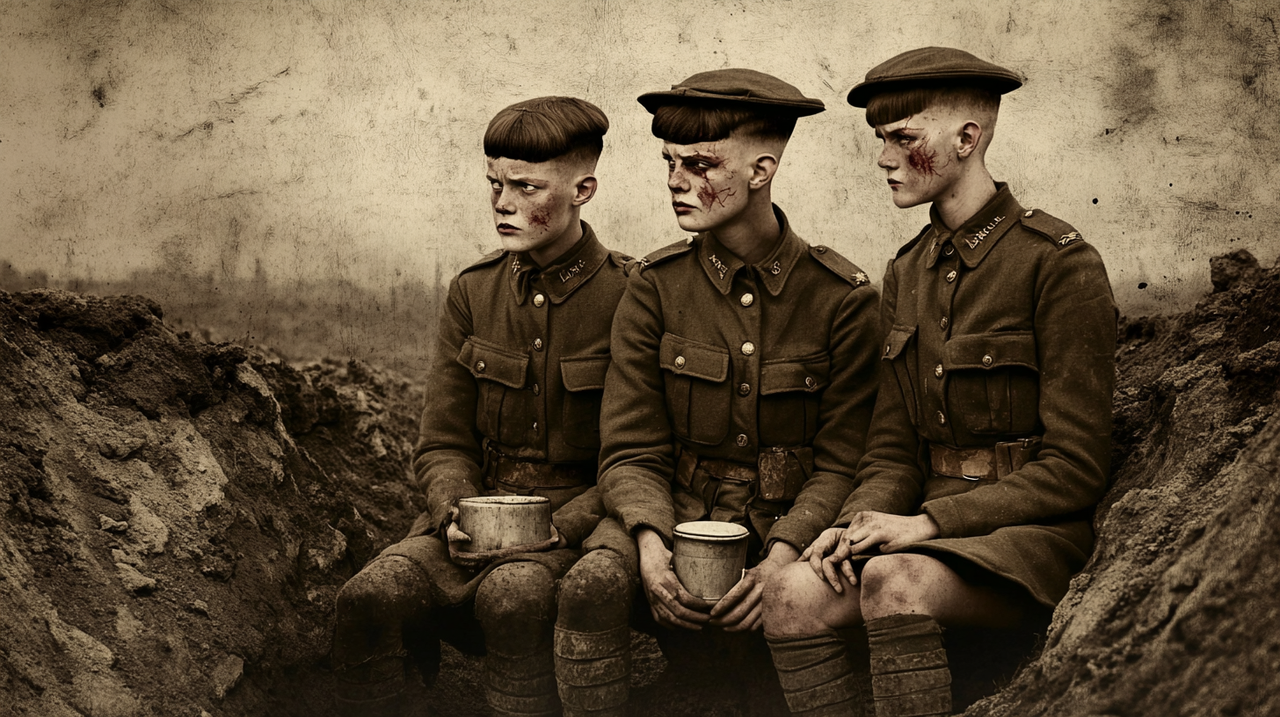
Rituals of Remembrance: Honoring the Fallen
One of the Ghost Squad's most sacred practices was the Ritual of Remembrance. When a member of the squad fell, the surviving members would hold a quiet vigil, gathering in a hidden spot to sing a melody that encapsulated her essence. This ritual served as both a farewell and a vow, a way to ensure that even in death, they would not be forgotten. Each woman’s song was unique, drawing from fragments of lullabies, folk tunes, and battlefield hymns they had shared. As their numbers dwindled, these songs became a haunting collection of memories, a tribute to the squad’s resilience.
Angel’s song, which would later be known as "The Soldier’s Last Call," was the squad’s final composition. Her melody, filled with both sorrow and defiance, came to symbolize the spirit of the Ghost Squad itself—a haunting reminder of lives lived on their own terms, despite the rules of society. The song was passed down, carried by the few who survived, reaching those beyond the war and eventually becoming a legend in its own right.
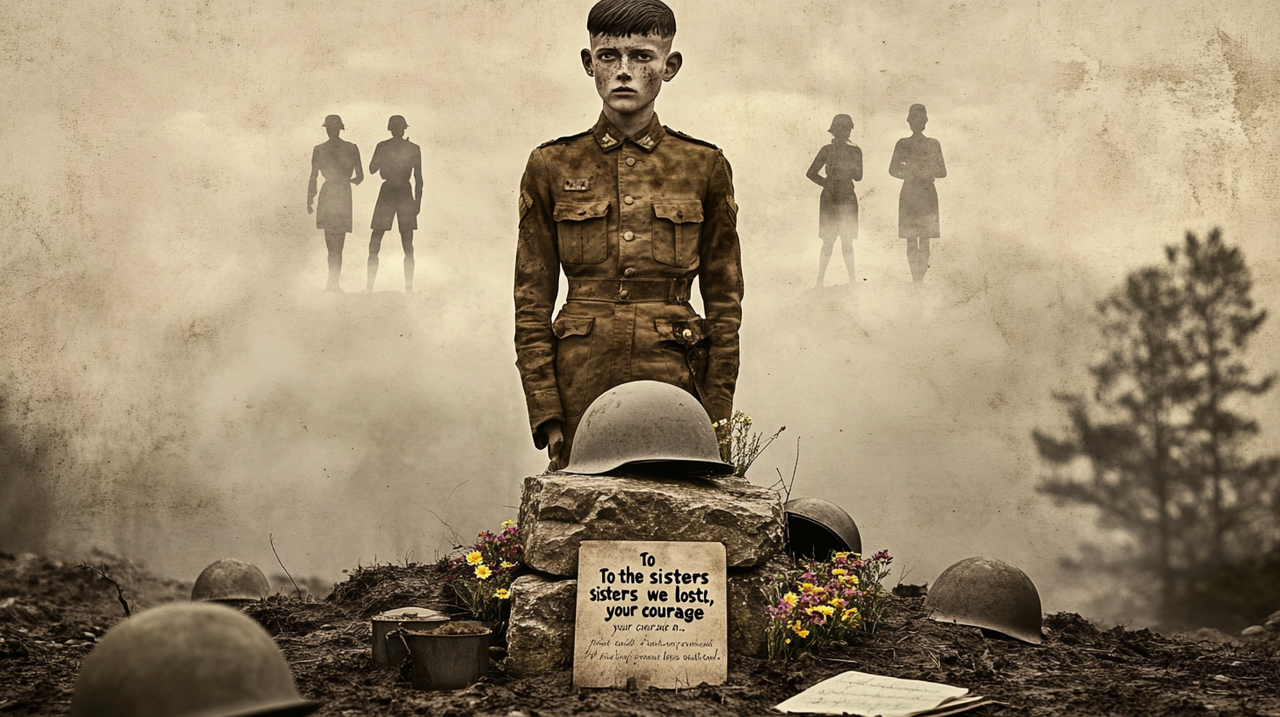
The Legacy of the Ghost Squad
Though the Ghost Squad was disbanded by the end of the war, their legacy endured in the stories and songs that followed. Survivors spoke of their bravery in hushed tones, and a few dared to reveal the truth of their identities in later years. However, most carried the memory in silence, bound by the pact they had sworn. Over time, the Ghost Squad became a symbol of unbreakable will, inspiring future generations of women to carve their own paths, regardless of societal expectations.
The Song's Influence Across Time
Since Angel’s final melody was heard in the trenches, her song has taken on a life of its own. From wartime ballads to modern-day electronic music, her melody resurfaces across genres and generations, shaping the culture of those who come across it. The song's themes of sacrifice and courage resonate particularly during times of hardship, embedding itself into the fabric of human resilience.
1917 - The Birth of the Song
The melody first surfaced in the chaos of the Western Front, sung by Angel with her dying breath. It became known among her comrades as "The Soldier’s Last Call."
1940s - WWII Resistance Songs
In France, members of the resistance reported hearing a familiar tune in the bombed-out remains of Paris. Local soldiers adapted the melody into a mournful ballad known as "L'Appel du Soldat," honoring fallen comrades.
1960s - Folk Music Revival
Folk musicians picked up fragments of Angel's melody, unknowingly weaving her song into the protest music of the era. The famous folk singer Eva Shore’s "Echoes of the Brave" became an anthem, its origins tied to Angel's song.
1990s - The Psychedelic Revival
The Poppy Fields, an underground alt-rock band, releases a gritty, grunge-inspired track called "Home in the Trenches." The song fuses Angel’s haunting melody with distorted guitars and psychedelic effects, transforming her story of longing and loss into a modern anthem against the horrors of war. Their lyrics blend dark humor with nostalgia, reimagining Angel’s words through the lens of the disillusioned 90s underground scene.
2020s - The Age of Rediscovery
Historians uncover records of Angel Lorelei and the Ghost Squad, sparking renewed interest in the mysterious melody. Digital artists remix the song with futuristic sounds, calling it "Angel’s Legacy."
1940s - L'Appel du Soldat
Listen to L'Appel du Soldat1960s - Echoes of the Brave
Listen to Echoes of the Brave1990s - Home in the Trenches
Listen to Home in the TrenchesModern Transmission from Space
In 2023, astrophysicists monitoring deep-space frequencies detected a pattern they named “The Phantom Signal.” This melody, when analyzed, bore striking resemblance to Angel's song, sparking theories that it was a cosmic echo of her final melody. Skeptics claimed it was a hoax, but others believed it to be a true message from the past. This signal has been added to the proper signal tab for further analysis and historical context.

Some theorists argue that this transmission is an alien response to Angel's song, or even a glimpse into a shared cosmic consciousness. The Phantom Signal remains an enigma, captivating artists, scientists, and dreamers worldwide.
Exploring the Phantom Signal
The Phantom Signal, detected in 2023, was a distinct melody with a haunting resemblance to Angel Lorelei's final song. It appeared to originate from a distant star system, which has since been under active observation by multiple international space agencies. Researchers have been attempting to decode the origins and meaning of the signal, leading to the following theories:
- Cosmic Echo Theory: This theory posits that the Phantom Signal is an echo of Angel's song, somehow transmitted into the cosmos and reflected back to Earth after decades. Supporters of this theory cite the structure of the melody as evidence of a temporal resonance effect, where certain frequencies can be preserved and returned.
- Alien Response Theory: Another popular theory is that the Phantom Signal is an alien response to Angel's final melody. Proponents believe that extraterrestrial civilizations could have intercepted the melody and responded, viewing it as a message of peace or distress.
- Shared Cosmic Consciousness: This theory suggests that the Phantom Signal is a manifestation of a shared consciousness that transcends time and space. Angel's melody, born in the chaos of war, may have resonated on a universal level, reaching into the cosmic subconscious and reflecting back to humanity.
- Hoax or Interference: Skeptics maintain that the Phantom Signal is either an elaborate hoax or simply an anomaly caused by signal interference. They argue that without verifiable proof, it's more likely that the resemblance to Angel's melody is coincidental.
Despite these differing perspectives, the Phantom Signal has become a symbol of mystery and hope, bridging the gap between the horrors of the past and the unknown vastness of the universe. It has inspired countless artists, musicians, and writers, much like Angel Lorelei's original song.
2023 - The Phantom Signal
Listen to the Phantom Signal
This whole story about Angel Lorelei sounds more like a legend than fact. I mean, an entire squad of women disguised as men in WW1? There’s no way they’d pull that off undetected.